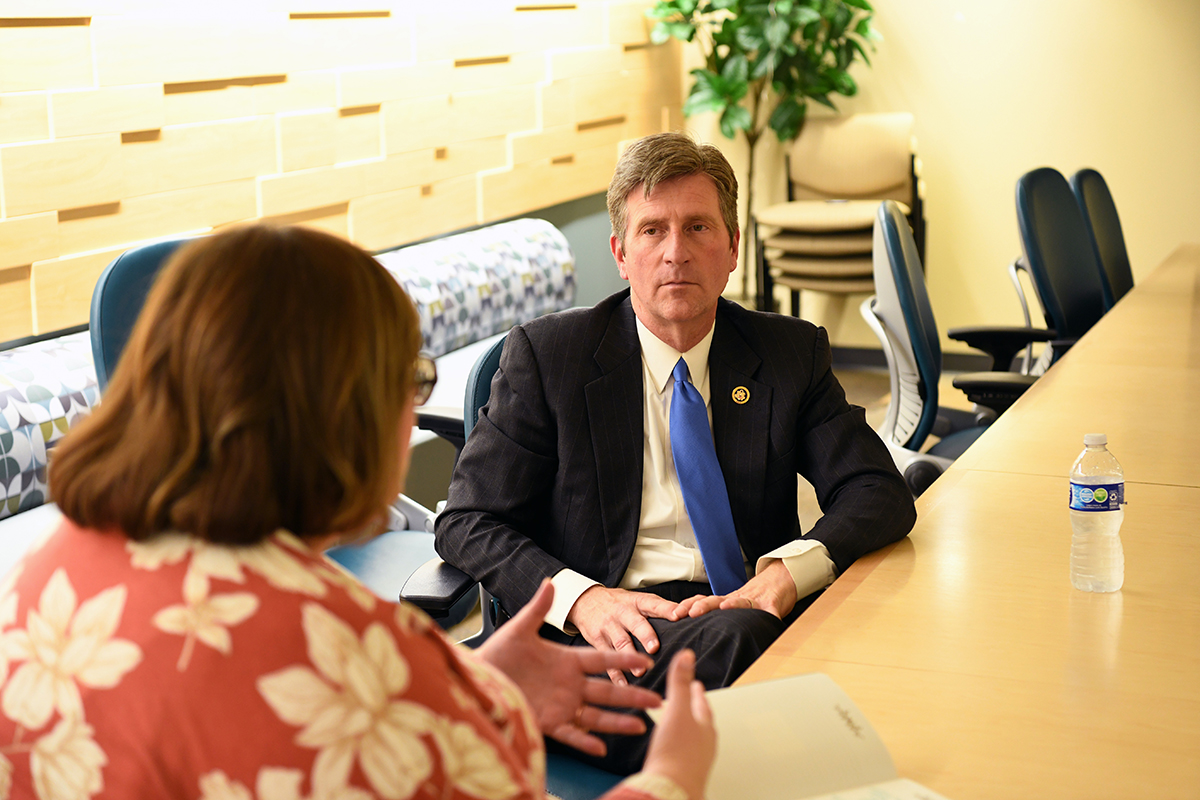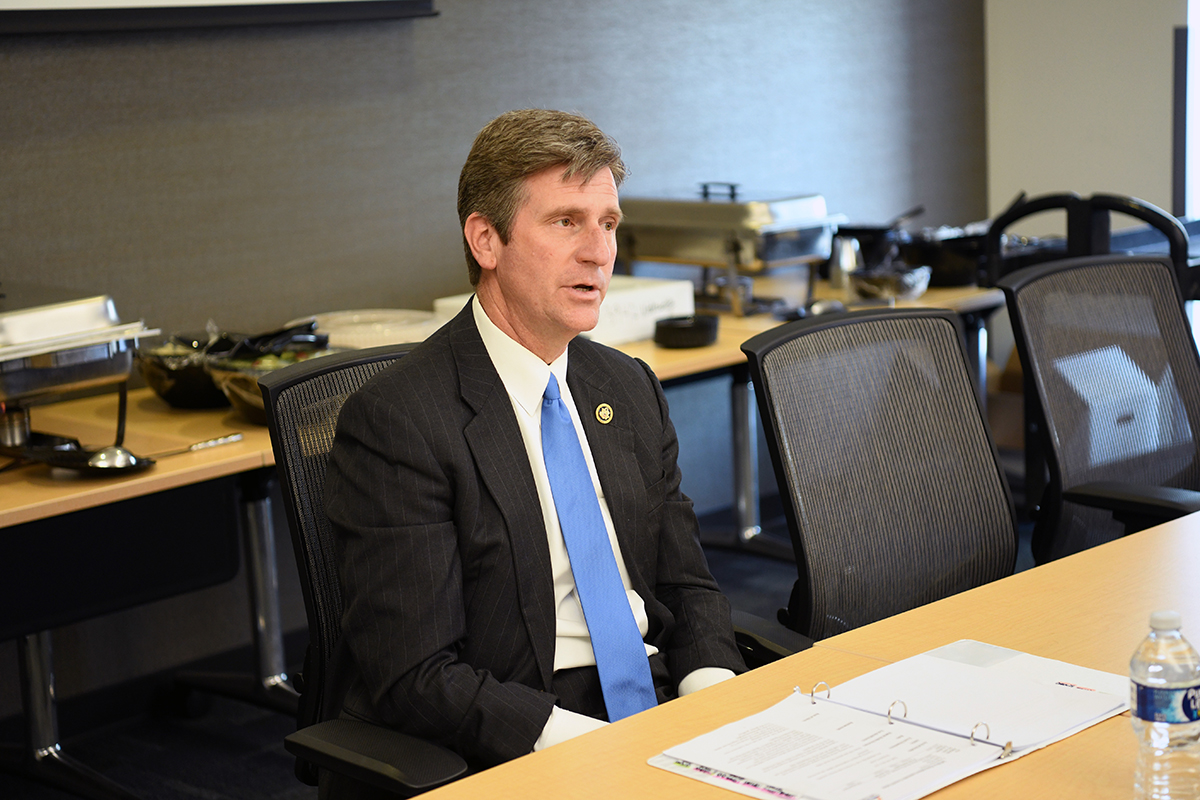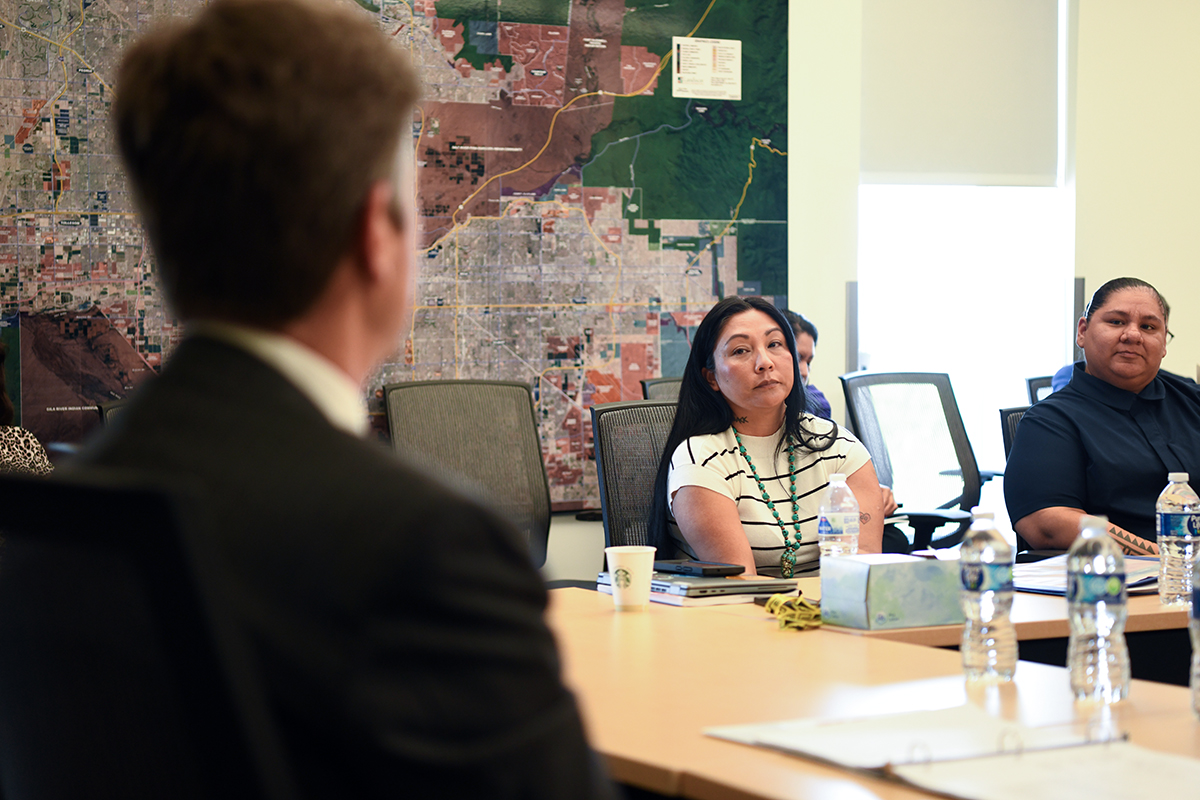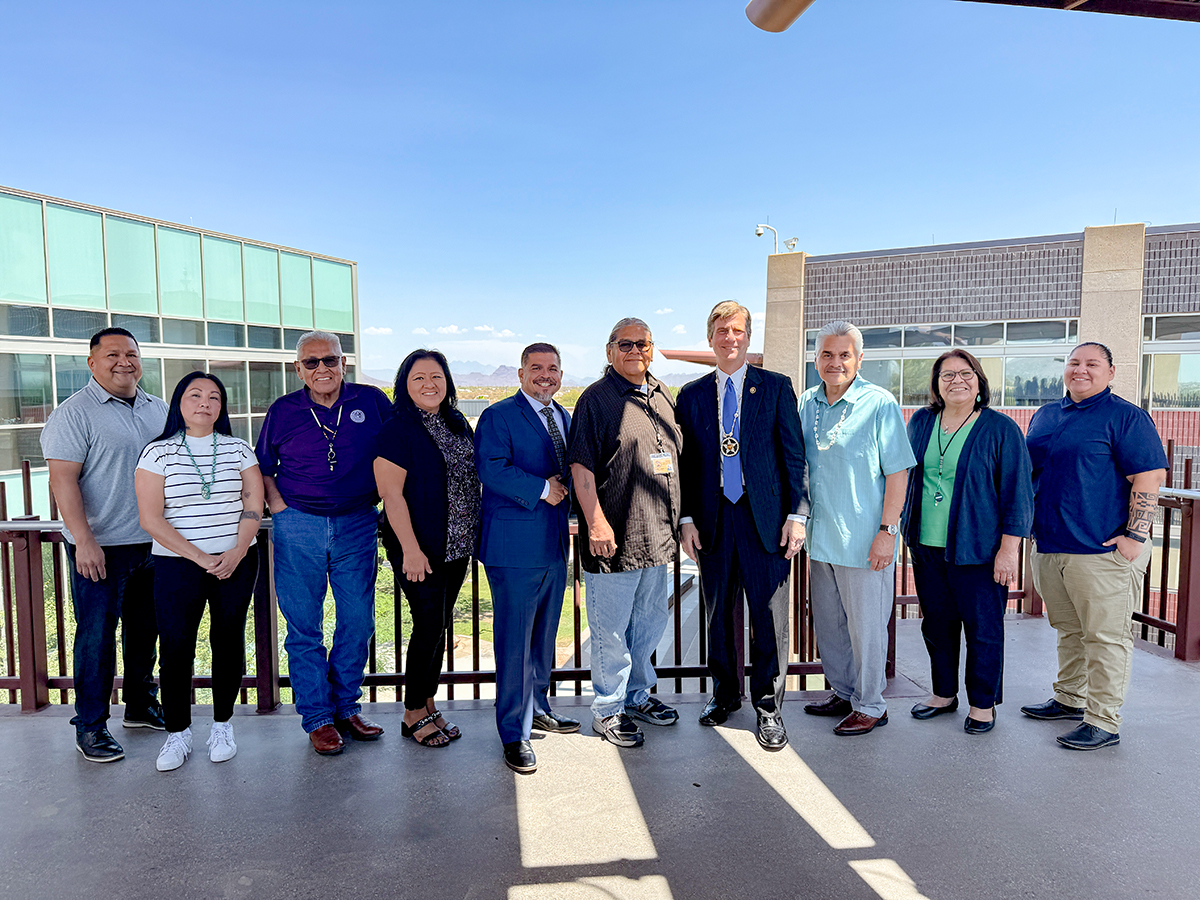VIEWS: 782
September 10, 2025Congressman Greg Stanton Visits with SRPMIC
3 Takeaways:
• Stanton’s visit was part of efforts to continue improving relationships and understand the needs of the Community.
• While here he discussed working with Rep. Schweikert to effectively represent constituents across Arizona as well as visited the Family Advocacy Center for updates on the MMIP Taskforce.
• Council members asked questions and shared concerns about federal government restructuring, life expectancy, heat risks, and Oak Flat.
On August 21, U.S. Congressman Greg Stanton entered the Whirlwind conference room in Two Waters Building A and was greeted by Salt River Pima-Maricopa Indian Community Tribal Council members, executive staff, directors and managers.
The visit was part of Stanton’s efforts to continue to improve his relationship with the SRPMIC and get a better understanding of the needs of the Community.
“I just want to welcome you, especially since you’re [technically] not our representative,” began SRPMIC President Martin Harvier during the introductions.
Congressman David Schweikert represents Arizona’s 1st Congressional District in the U.S. House of Representatives, which includes the SRPMIC and parts of Phoenix, Scottsdale, Paradise Valley and Fountain Hills.
Stanton replied to President Harvier, “Every time you invite me, I’ll be here.”
The visit was the third time Congressman Stanton has visited the Community. He represents the 4th Congressional District, which includes parts of Maricopa County, the cities of Tempe and Mesa, and parts of Chandler.
Stanton was positive when he discussed how he and fellow Congressman Schweikert work together. “On issues when we need to come together as ‘Team Arizona,’ including supporting our tribal communities, for the most part we work together on that,” Stanton said.
He added, “That’s a part of politics; you have to get the job done for the people you represent. My feeling is, if you’re a congressional representative for Arizona, you represent the tribes. It’s part of the honor to serve in federal office.”
Throughout his meeting, Congressman Stanton provided key insight from his time in Washington, D.C., and continually asked how he and his office can better help the Community.
President Harvier then began discussing important topics with Congressman Stanton, which included the possibility of a federal government shutdown. “The question is, ‘Is there a government shutdown?’ The answer is yes, there is a possible government shutdown,” said Stanton.
“We have voted on a budget, and yet the current administration keeps asking us to do recission packages,” he added.
A recission package is a formal request by the president to Congress to cancel previously approved funding.
Stanton continued, “Our Republican friends, they’re in charge of everything: the White House, Senate and the House of Representatives. They have a big decision to make. Do they want to make a bipartisan decision or go at it alone?”
Congressman Stanton read a prepared speech to the SRPMIC in which he shared his appreciation for the opportunity to visit the Community and meet with executive staff and management.
“Thank you for having me back and inviting me; it’s an honor. Though I don’t represent the Community, we’re next-door neighbors and I love working with you and your professional team. I am concerned with the ‘Big Beautiful Bill’ that just passed; however, the SRPMIC did a great job at carving out some exceptions for tribal communities, which will have somewhat of a lesser impact here on the Community,” he said.
President Donald Trump signed the bill, officially named the One Big Beautiful Bill Act, into law on July 4. The “Big, Beautiful Bill,” as it is called, drastically cuts funding from communities across the country, both tribal and non-tribal communities, by cutting programs like Medicaid, the Supplemental Nutrition Assistance Program and clean energy programs.
“Our food banks don’t know where their food is going to come from,” said Stanton. “The fact we’re taking away healthy meals for kids—I can’t even believe we are doing it.”
Additionally, Stanton reiterated to the SRPMIC that he would like to partner with the Community when it comes to protecting water rights and being able provide support during the ongoing drought occurring throughout Arizona.
“We can defeat this drought, but it’s going to take a lot more money and recycling. Better conservation is the better approach right now,” shared Stanton.
SRPMIC Council Member Questions to Congressman Stanton
David Antone
When it was time for SRPMIC Council members to ask questions, David Antone spoke first and asked Congressman Stanton about the tariffs and their impact on the economy.
“With many of the countries, the tariffs are in place. As far as us as consumers, we have yet to experience the full effect of the tariffs,” said Stanton. “Inflation is going to start to go up.”
He added, “I’m very much opposed to the tariffs. I think it’s backward economic policy. And they’re illegal. The reason why they’re illegal is because under our Constitution, the Congress, which I serve in, we get to set the revenue and taxes. What President Trump did is he declared a national emergency, so he gets to set the policy. He’s taken the power away, and my Republican friends are just giving it to him.”
Jacob Butler
Council member Butler had two topics he wanted to discuss with Congressman Stanton: keeping safe from the sun and hydration. “I appreciate the fact that you’re working on both of those. To see you work on the heat wave and water, I appreciate that you’re making progress on that,” said Butler.
He continued, “A lot of our people around the Valley suffer from the sun in their own homes from lack of air conditioning and especially from the concrete jungle that we have in Arizona. That daytime heat comes out in the middle of the night, so people can’t escape the heat even in the darkness.”
Stanton agreed. “I appreciate you saying that. We made huge mistakes, like cutting trees down in urban areas. We want people to take public transportation, but the benches don’t have shade, and we need to consider heat inside all of our buildings and how it impacts our infrastructure.
“Communities in high-heat areas need to be taken into account. It is sad, having a senior living alone, they have air conditioning, they just keep [the temperature] too high and not cool enough thinking they’ll save a few bucks because they’re on a fixed income. [They’re] not realizing the toll it will take on their bodies [and health, especially] if they have comorbidities. It’s not acceptable.”
Mikah Carlos
Council member Mikah Carlos asked Congressman Stanton about the restructuring of the U.S. Health and Human Services Department and its future impact on communities including the SRPMIC.
“I feel like we made progress with consultations with the federal government, but now it feels like we’re taking steps back,” said Carlos. Also, in those HHS restructurings, we have a lot of concerns with the federal government. We’re efficient on our end, but when we send grant proposals to the federal government, we get a delay and essentially our people are suffering because the [agency] staff has been slashed, restructuring to the point where the program is inefficient.”
Stanton wholeheartedly agreed with Carlos. “In the history of the United States, we’ve done a lot of dumb things. One of the dumbest was DOGE.”
The Department of Government Efficiency, or DOGE, was established on January 20 of this year. The initiative’s goal was to cut excess regulations and spending within the federal government. DOGE is responsible for the surge of recent immigration crackdowns as well as massive layoffs in departments and agencies within the federal government.
“There was a recent report [stating] that the entire DOGE process ended up costing more money than it saved,” stated Stanton.
Su:K Fulwilder
“I just want to mention Resolution Copper and Oak Flat,” began Council member Su:K Fulwilder. Once she began speaking, Stanton turned to give her his undivided attention.
“We’re talking about water, and [Resolution Copper] is the biggest threat to our water right now. This is something that is very concerning to me.”
Stanton nodded in agreement. “I appreciate you telling me that,” he said. “I know there’s an ongoing court case, and it looks like it may reach the Supreme Court,” he said.
At the conclusion of his one-hour meeting, Stanton received gifts from the Community, which included a shell necklace. He also posed for photos with the SRPMIC Council team on the third-floor complex bridge of Two Waters before embarking a field trip on foot to the SRPMIC Family Advocacy Center.
During his visit to the center, Stanton met with Nagisa Kondo, director of the center, and Alane Breland, prosecutor for the SRPMIC Justice Center. They shared with him the inner workings of the FAC program and updated him on the progress of Missing and Murdered Indigenous People in Arizona.











